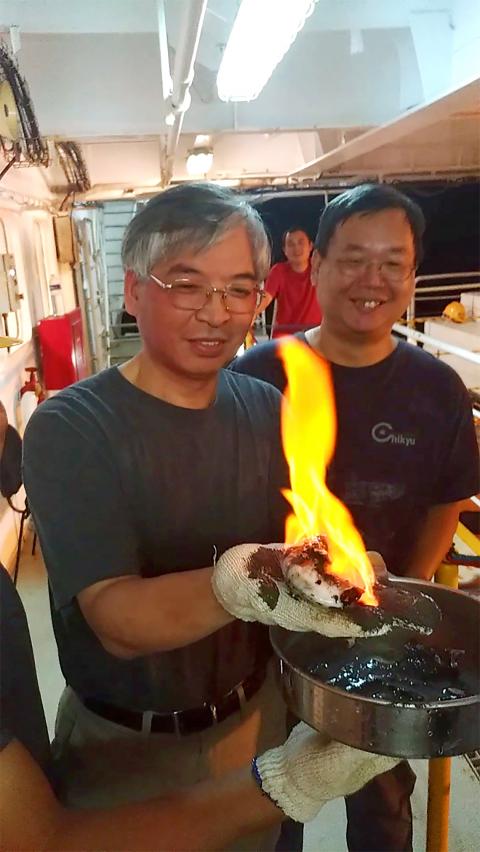A team of Taiwanese and French researchers has extracted frozen methane hydrates known as “combustible ice” from under the seabed off Taiwan’s southwestern coast, the Ministry of Science and Technology said on Friday, hailing the achievement as a milestone for the nation’s energy exploration.
The team made the extraction on Thursday at 3:52am in waters near 22° north latitude and 120° east longitude on board the French research vessel Marion Dufresne, the ministry said.
The team used a core sampler to reach a seamount 1.2km below the ocean’s surface and the researchers found that the sampler had scooped up a piece of methane ice, it said.

Photo courtesy of the Ministry of Science and Technology
The discovery was unexpected, as the team originally aimed to evaluate seabed stability in the area, said National Central University (NCU) Department of Earth Sciences professor Lin Jing-yi (林靜怡), who led the project.
The project is part of the second phase of the ministry’s National Energy Program, Lin said, adding that she did not join the voyage herself.
The combustible ice would be kept in Taiwan for further study, in accordance with an agreement with French scientists, Lin said.
Accumulated evidence — mostly gathered by sonar navigation — suggests that the area is rich in methane reserves and combustible ice, Taiwan Oceanic Research Institute director Wang Chau-chang (王兆璋) said.
The discovery came after research that began in 2002, he said, adding that core sampling is a challenging task that requires careful operation of the sampler’s heavy machinery.
Had the nation’s Ocean Researcher V not sunk on Oct. 10, 2014, off the coast of Penghu County, the nation might have made the discovery earlier, Wang said, adding that the duration of the energy program, which is to conclude by the end of this year, could also have been extended.
Wang said he regrets that marine exploration of an energy source in Taiwan can secure funding only when it becomes a trendy subject, adding that China, Japan and South Korea have long been devoting resources to exploring marine energy sources.
The team is to elaborate on their findings at a news conference in Taipei on Wednesday, while the ship’s leading scientist, Hsu Shu-kung (許樹坤), also an NCU professor, is to show video footage of the methane ice, Lin said.

Taiwanese actress Barbie Hsu (徐熙媛) has died of pneumonia at the age of 48 while on a trip to Japan, where she contracted influenza during the Lunar New Year holiday, her sister confirmed today through an agent. "Our whole family came to Japan for a trip, and my dearest and most kindhearted sister Barbie Hsu died of influenza-induced pneumonia and unfortunately left us," Hsu's sister and talk show hostess Dee Hsu (徐熙娣) said. "I was grateful to be her sister in this life and that we got to care for and spend time with each other. I will always be grateful to

REMINDER: Of the 6.78 million doses of flu vaccine Taiwan purchased for this flu season, about 200,000 are still available, an official said, following Big S’ death As news broke of the death of Taiwanese actress and singer Barbie Hsu (徐熙媛), also known as Big S (大S), from severe flu complications, the Centers for Disease Control (CDC) and doctors yesterday urged people at high risk to get vaccinated and be alert to signs of severe illness. Hsu’s family yesterday confirmed that the actress died on a family holiday in Japan due to pneumonia during the Lunar New Year holiday. CDC Deputy Director-General Tseng Shu-hui (曾淑慧) told an impromptu news conference that hospital visits for flu-like illnesses from Jan. 19 to Jan. 25 reached 162,352 — the highest

TAIWAN DEFENSE: The initiative would involve integrating various systems in a fast-paced manner through the use of common software to obstruct a Chinese invasion The first tranche of the US Navy’s “Replicator” initiative aimed at obstructing a Chinese invasion of Taiwan would be ready by August, a US Naval Institute (USNI) News report on Tuesday said. The initiative is part of a larger defense strategy for Taiwan, and would involve launching thousands of uncrewed submarines, surface vessels and aerial vehicles around Taiwan to buy the nation and its partners time to assemble a response. The plan was first made public by the Washington Post in June last year, when it cited comments by US Indo-Pacific Commander Admiral Samuel Paparo on the sidelines of the Shangri-La Dialogue

Suspected Chinese spies posing as Taiwanese tourists have been arrested for allegedly taking photographs of Philippine Coast Guard ships, local media reported. The suspected spies stayed at a resort in Palawan, where from a secluded location they used their phones to record coast guard ships entering and leaving a base, Philippine TV network GMA said on Wednesday. Palawan is near the Spratly Islands (Nansha Islands, 南沙群島) and other disputed areas of the South China Sea, where tensions have been on the rise between China and the Philippines. The suspects allegedly also used drones without permission and installed cameras on coconut trees in the